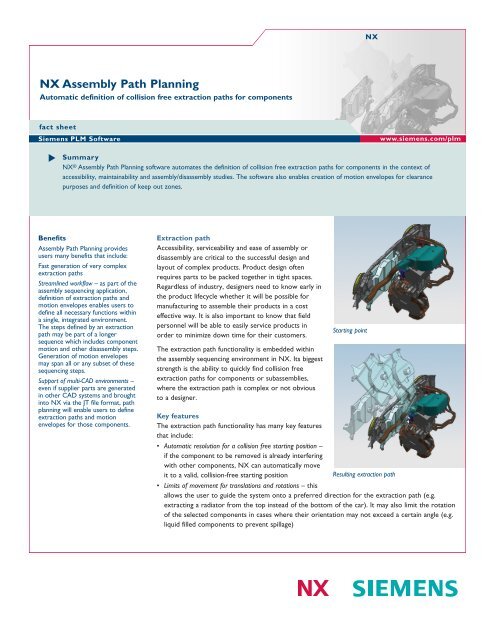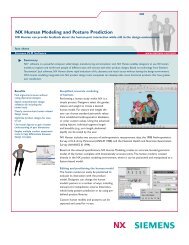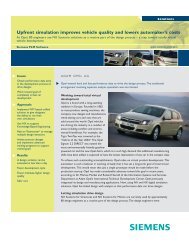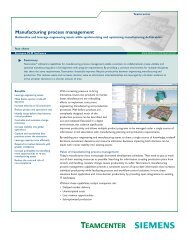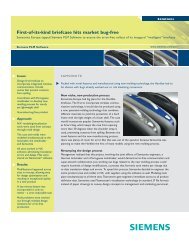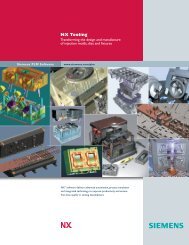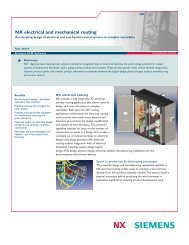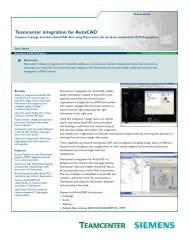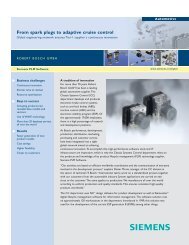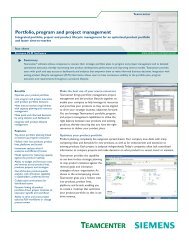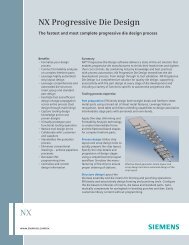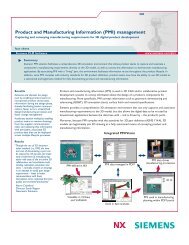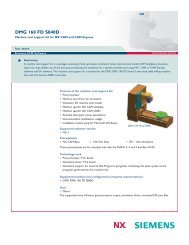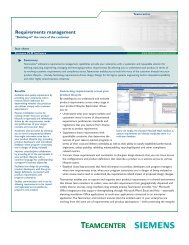NX Assembly Path Planning Fact Sheet
NX Assembly Path Planning Fact Sheet
NX Assembly Path Planning Fact Sheet
Create successful ePaper yourself
Turn your PDF publications into a flip-book with our unique Google optimized e-Paper software.
<strong>NX</strong><br />
<strong>NX</strong> <strong>Assembly</strong> <strong>Path</strong> <strong>Planning</strong><br />
Automatic definition of collision free extraction paths for components<br />
fact sheet<br />
Siemens PLM Software<br />
www.siemens.com/plm<br />
Summary<br />
<strong>NX</strong> ® <strong>Assembly</strong> <strong>Path</strong> <strong>Planning</strong> software automates the definition of collision free extraction paths for components in the context of<br />
accessibility, maintainability and assembly/disassembly studies. The software also enables creation of motion envelopes for clearance<br />
purposes and definition of keep out zones.<br />
Benefits<br />
<strong>Assembly</strong> <strong>Path</strong> <strong>Planning</strong> provides<br />
users many benefits that include:<br />
Fast generation of very complex<br />
extraction paths<br />
Streamlined workflow – as part of the<br />
assembly sequencing application,<br />
definition of extraction paths and<br />
motion envelopes enables users to<br />
define all necessary functions within<br />
a single, integrated environment.<br />
The steps defined by an extraction<br />
path may be part of a longer<br />
sequence which includes component<br />
motion and other disassembly steps.<br />
Generation of motion envelopes<br />
may span all or any subset of these<br />
sequencing steps.<br />
Support of multi-CAD environments –<br />
even if supplier parts are generated<br />
in other CAD systems and brought<br />
into <strong>NX</strong> via the JT file format, path<br />
planning will enable users to define<br />
extraction paths and motion<br />
envelopes for those components.<br />
Extraction path<br />
Accessibility, serviceability and ease of assembly or<br />
disassembly are critical to the successful design and<br />
layout of complex products. Product design often<br />
requires parts to be packed together in tight spaces.<br />
Regardless of industry, designers need to know early in<br />
the product lifecycle whether it will be possible for<br />
manufacturing to assemble their products in a cost<br />
effective way. It is also important to know that field<br />
personnel will be able to easily service products in<br />
order to minimize down time for their customers.<br />
The extraction path functionality is embedded within<br />
the assembly sequencing environment in <strong>NX</strong>. Its biggest<br />
strength is the ability to quickly find collision free<br />
extraction paths for components or subassemblies,<br />
where the extraction path is complex or not obvious<br />
to a designer.<br />
Starting point<br />
Key features<br />
The extraction path functionality has many key features<br />
that include:<br />
• Automatic resolution for a collision free starting position –<br />
if the component to be removed is already interfering<br />
with other components, <strong>NX</strong> can automatically move<br />
it to a valid, collision-free starting position<br />
Resulting extraction path<br />
• Limits of movement for translations and rotations – this<br />
allows the user to guide the system onto a preferred direction for the extraction path (e.g.<br />
extracting a radiator from the top instead of the bottom of the car). It may also limit the rotation<br />
of the selected components in cases where their orientation may not exceed a certain angle (e.g.<br />
liquid filled components to prevent spillage)
fact sheet<br />
<strong>NX</strong><br />
• Generation of smooth path – once a collision-free path is found, the system will automatically provide<br />
a smooth result<br />
• Solid/lightweight input – extraction path may be generated based on precise or lightweight (JT) bodies<br />
• Extraction path integrated into assembly/disassembly steps of other components within the assembly – as part<br />
of the sequencing application the extraction path may be embedded in the middle of the assembly or<br />
disassembly process<br />
Limits of movement<br />
Motion envelope<br />
When products are designed with accessibility in mind, it is<br />
important to be able to define keep out regions which must be<br />
left clear of components. Designs also need to account for<br />
component motion to ensure that necessary clearances are<br />
maintained as this motion is activated.<br />
The motion envelope functionality is also embedded within the<br />
assembly sequencing environment in <strong>NX</strong>.<br />
Key features<br />
The motion envelope functionality has many key features<br />
that include:<br />
• Solid/lightweight input – motion envelopes may be generated<br />
based on one or multiple precise or lightweight (JT) bodies<br />
• Step selection – users may generate a motion envelope for a<br />
subset or all of the steps in an assembly sequence<br />
• Quality setting control – depending on the desired accuracy for<br />
the output envelope, users may select low, medium, high or<br />
custom quality settings. The purpose of the control is to<br />
achieve the right balance between precision and performance<br />
• Background processing – users may choose for the envelope to<br />
be computed as a batch process to enable them to continue<br />
working in <strong>NX</strong> while the shape is generated<br />
Motion envelope<br />
Resulting envelope shape<br />
Contact<br />
Siemens PLM Software<br />
Americas 800 498 5351<br />
Europe +44 (0) 1276 702000<br />
Asia-Pacific 852 2230 3333<br />
www.siemens.com/plm<br />
© 2007. Siemens Product Lifecycle Management Software Inc. All rights reserved. Siemens and the Siemens logo are registered trademarks of Siemens AG.<br />
Teamcenter, <strong>NX</strong>, Solid Edge, Tecnomatix, Parasolid, Femap, I-deas, JT, UGS Velocity Series, Geolus and the Signs of Innovation trade dress are trademarks or<br />
registered trademarks of Siemens Product Lifecycle Management Software Inc. or its subsidiaries in the United States and in other countries. All other logos,<br />
trademarks, registered trademarks or service marks used herein are the property of their respective holders. 9/07


